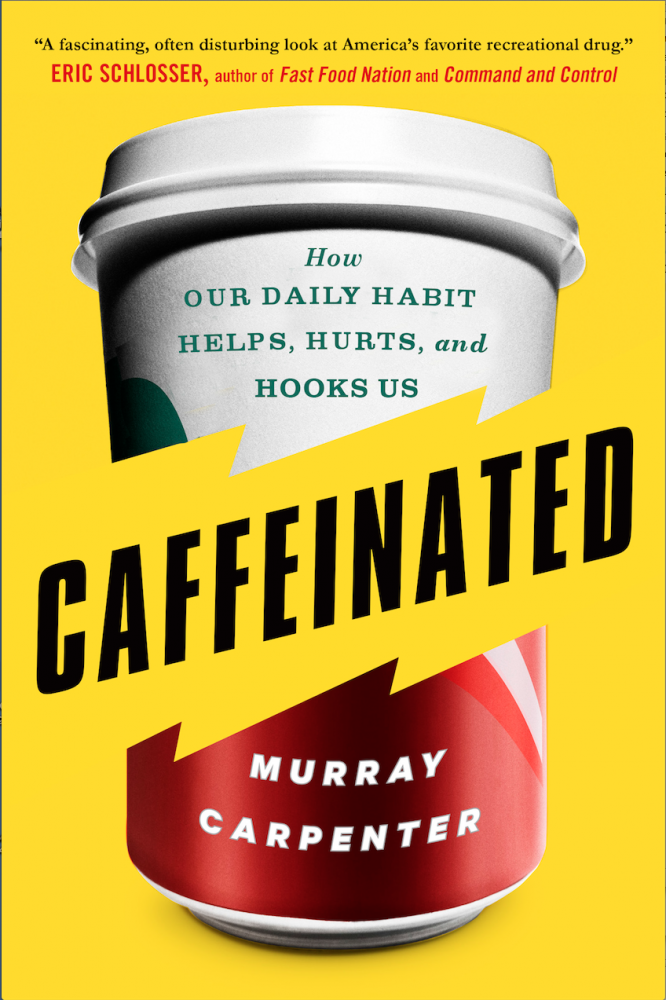Murray Carpenter has been drinking coffee daily since his late teens, and has long been intrigued by caffeine. He’s also the author of Caffeinated, How Our Daily Habit Helps, Hurts and Hooks Us – a book about the world’s most popular drug … caffeine. In his career, Murray Carpenter has reported for the New York Times, The Washington Post, Wired, National Geographic and NPR. He’s also an interesting guy to chat to...

What inspired you to write Caffeinated: How Our Daily Habit Helps, Hurts, and Hooks Us?
“As a psychology major at the University of Colorado, many years ago, I wrote a paper about how caffeine affects cognition. Then, in 2010, I was working on a radio story in Colombia, which took me to a coffee farm. At the farm, I began to think about the size and global reach of the coffee industry. About that time, the controversies over energy drinks were in the news. And it seemed like a good time to take a big, wide-angle look at caffeine.”
What do you want people to take away from reading the book?
“My goal was to help people understand caffeine better. Although most Americans consume caffeine daily – in coffee, tea, chocolate, sodas or energy drinks – many of us don’t really understand the drug itself. In better understanding caffeine, I think people can do more to use it better, to maximise its benefits and minimise its risks. Of course, this already seems a bit controversial, because a lot of people don’t like to think of caffeine as a drug. They’d rather think, ‘Oh, I just enjoy drinking coffee.’”
In your book, you say caffeine is a drug whose strength is consistently underestimated?
“Caffeine has real physiological effects, even at moderate levels – the amount of caffeine in a small cup of coffee, or even the mere 35 milligrams or so that you get in a cup of tea or a can of Coke. It makes you more alert, increases your athletic performance, and generally improves your mood, making you feel good. At higher levels, it can make you jittery, anxious, and interfere with sleep.”
What do the studies of experimentally caffeinated athletes, soldiers and students tell us?
“In many situations caffeine enhances physical and mental performance. No surprise, the benefits are most notable when people are tired.”
Could caffeine kill you?
“It would be very difficult, to get a lethal dose from consuming coffee, tea, or sodas, you just couldn’t get enough. You’d have to drink something like 50 cups of coffee at once, or 200 cups of tea or cans of soda. But pure caffeine powder is powerful stuff. Ten grams, about a tablespoon, is a reliably lethal dose for an adult.”
Coffee drinkers don’t often hear about the ‘white powder’ you mention…how is it produced?
“In the book, I describe a visit to a decaffeination facility in Texas. It uses supercritical carbon dioxide (CO2 at high heat and high pressure) to remove the caffeine from coffee beans. The plant’s primary product is decaffeinated coffee, but it also produces pure, powdered caffeine as a byproduct. So, it was an interesting chance to see the beans we are all so familiar with, and fond of, juxtaposed with the refined powder that gives coffee its kick.”
What exactly is the “caffeine industrial complex”?
“That’s a term that the author and food activist Marion Nestle used in reviewing my book. The idea is that the caffeinated-products industry is far bigger than just coffee, tea, and chocolate, which are plants that naturally contain caffeine and have long histories of human use. It also includes the soda industry, which is three times the size of the coffee trade. And even over-the-counter drugs like Vivarin, Excedrin, Anacin, and prescription drugs like Cafergot, which is used to treat migraine headaches.”
Should the average coffee drinker be concerned about their coffee habit?
“For most people, moderate coffee consumption is a healthy habit. The exceptions are people who are pregnant, who are advised to limit their caffeine intake. Also, people suffering from anxiety or insomnia might find that they benefit from restricting, or eliminating, their coffee consumption.”
Did you discover anything particularly interesting during your research?
“One of the most interesting aspects of the research was visiting coffee farms in Colombia, Guatemala, and Mexico. As I learned about growing Arabica coffee, it was surprising to hear how fussy the plants are. They need rain at just the right time in order to flower, for example. Other times they like it dry. And coffee growers all over the world are being challenged by a warming, changing climate.”
If there’s one thing coffee lovers should take away from reading your book, what should it be?
“Caffeinated coffee can be a wonderful beverage, one of the very best, but it also deserves more respect.”
How have your travels and research affected your own coffee habit?
“I still drink three or four cups (about 24 ounces total) of good, strong coffee daily, and I appreciate it more than ever. I’ve started drinking coffee a bit more strategically. And I’ve become far more aware of the work behind our daily habit. So much has to go right in the growing, harvesting, shipping, roasting, and brewing to produce a decent cup of coffee.”
Caffeinated, How Our Daily Habit Helps, Hurts and Hooks Us is available from Amazon.